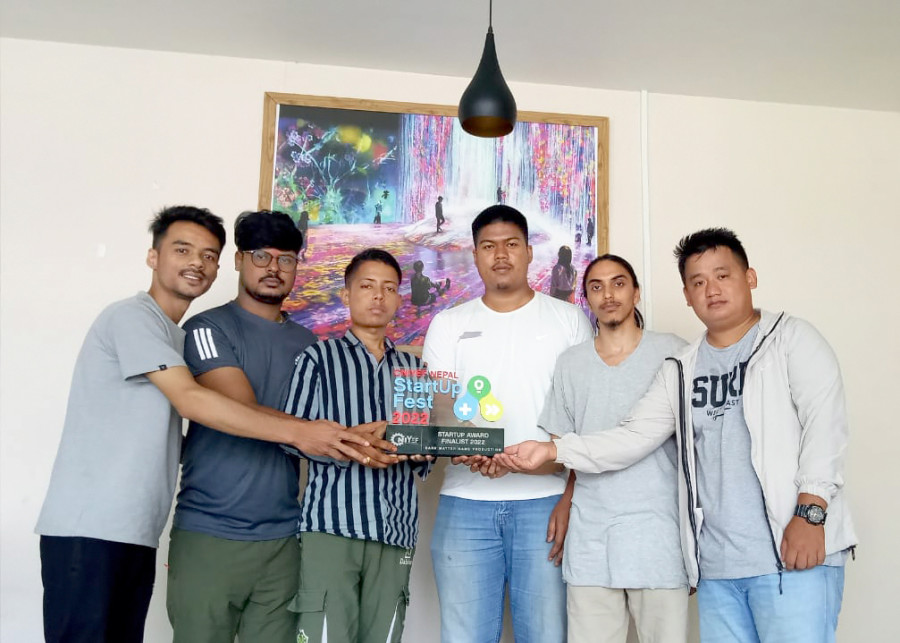Money
Dark Matter forges ahead in game development sector
The Nepali game developing community is still small and lacks motivation, according to industry insiders.
Pawan Pandey
Two friends, 23-year-old Asim Basnet and 21-year-old Prakash Shrestha, have enjoyed playing video games ever since they were children.
“We played every game we could get our hands on,” Shrestha, who is awaiting his final results in Electronics and Computer Engineering from Paschimanchal Campus in Pokhara, told the Post over the phone.
Their love for video games led the two childhood friends, born and brought up in Chitwan in south central Nepal, to seek a career in game development.
The duo had often wondered why there were no Nepali game developers despite a large base of gamers. “So after grade 12, we were almost certain that we wanted to be professionals in the gaming field,” said Shrestha. “I joined electronics and computer engineering to learn game development.”
Since 2018, they have pursued game development and have gradually improved their skills through trial and error. The two friends developed their first game which was similar to Subway Surfer. The game, which was developed on a Lenovo V310 laptop, was launched on Google Play in 2020.
Basnet, who is currently studying computer engineering at United Technical College in Chitwan, says they decided to dedicate their time to their vocation and thought about expanding the team. “We decided to register a company and hire some people who were as passionate about gaming as we were,” he said.
Subsequently, Dark Matter Game Production was registered as a company in December 2021.
Currently, the Dark Matter team comprises five members—Himal Timilsina, UI/UX designer; Prabin Gurung, database and server handler; Aakash Prasad Gupta, UX developer/engine programmer; Monika Mahato, concept artist; and Asbhin Adhikari, 3D modeller/texture artist—excluding Basnet, game designer and 3D modeller; and Shrestha, lead developer.
“We need to hire a sound artist, animator, designer, VFX artist and developer in the coming days,” said Basnet.
Dark Matter has launched two games so far—Sprite Ninja: Ninja Hattori and Sprite Ninja: Ninja Hattori Vancouver. The two games have been downloaded more than half a million times and 50,000 times, respectively.
“We completed our first game production phase this year and released the beta version of our first game which currently has over half a million downloads on the Google Play Store,” they wrote to the Post. “Our next plan is to complete the post-production of this game and release its final version.”
After releasing the final version, Basnet hopes to start earning a minimum of $10,000 monthly.
Seven of the top 10 start-ups were able to secure investment pledges totalling Rs245 million at the CNIYEF Nepal Start-Up Fest 2022, organised by the Confederation of Nepalese Industries Young Entrepreneurs Forum last Saturday.
Among the seven, Dark Matter Game Production received an investment pledge of Rs15 million, according to Basnet. “We are super excited. We presented our plans for the coming days at the start-up fest, and the investors loved it,” he said.
“The projects which made it to the final selection were given an opportunity for presentations,” the organisers said in a press statement. “After the presentations, the investors, in the presence of Baikuntha Aryal, secretary at the Ministry of Communication and Information Technology, made a preliminary agreement to make an equity investment in the projects.”
The other six start-ups which received investment pledges are Voxcro, Skill Sewa, Team Veda, Kheti, Digital Age Nepal and Doctors on Call. The investors are Team Ventures, Global Equity Fund, Aadhyanta Fund Management, Himalayan Capital and Televenture Partner, according to the statement.
Shrestha believes lack of funds is one of the reasons why there are only a few game developers in Nepal.
“I used to wonder why Nepalis did not develop video games. But now that I am in this business, I understand that funding, or lack thereof, is one of the major reasons,” he said. “I think that lack of sufficient funds, equipment and skills are the reasons behind the small number of game developers in the country.”
When Basnet and Shrestha started on their journey as game developers, they had to rely on their families for the initial investment. “Our families provided us with Rs500,000 each,” said Basnet. “We bought some pieces of equipment to upgrade the game we had launched earlier.”
The gaming market was valued at $198.40 billion in 2021, and it is expected to reach a value of $339.95 billion by 2027, according to Mordor Intelligence, a market intelligence and advisory firm.
Despite significant strides in the game development field, the Nepali game developing community is still small and lacks motivation, according to industry insiders.
“There are only a handful of game development companies in Nepal because there is almost no motivation for developers in educational institutions,” said Rahul Subedi, publisher of Pokhara-based Yarsa Games. “Most of the game developers in Nepal are self-driven.”
That’s why among those equipped with information technology (IT) knowledge, only a few choose game developing, Subedi says. “There is a shortage of skilled manpower in this sector mostly because people think there are no avenues available for career development,” Subedi told the Post.
“This is a vicious circle. Lack of motivation in educational institutions regarding game development causes fewer individuals to enter this field. Lack of manpower results in fewer start-ups pursuing game development. This leads to the production of only a few games which strengthens the view that there are no opportunities in game development,” said Subedi. “We need to break this circle.”
Subash Adhikari, vice-chairperson of the recently formed Kathmandu Chapter of the International Game Developers Association (IGDA), seconds Subedi.
In Nepal, according to Adhikari, one does not get enough time and opportunities to hone the skills required to become a professional game developer.
“Game development is not new in Nepal,” said Adhikari, who is a software developer by profession but has a passion for game development. “Many Nepali developers have been involved in outsourcing projects as well.”
Despite the hurdles, some of the games made by Nepalis have gained success, according to Subedi. Ludo, developed by Yarsa Games, has been downloaded more than 50 million times on the Google Play Store.
“If we could develop games targeting the right audiences, especially in neighbouring countries like India within a similar demographic, Nepali developers can make money doing what they are good at,” Subedi said.
Although their achievement in the gaming world is commendable, Basnet believes they still have a long way to go.
“We want to launch our games on platforms other than Android. We will also localise our products in different markets in the respective languages,” he told the Post.
“We are currently working on a game centred on role playing for the Android mobile platform. We will continue our production on different platforms and genres in the coming days,” Basnet said.




 9.6°C Kathmandu
9.6°C Kathmandu















